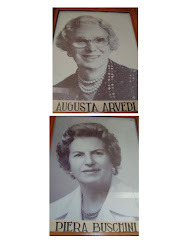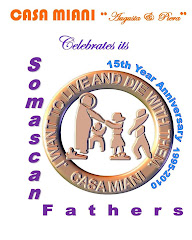THE CASA MIANI “Augusta & Piera” – SOMASCAN FATHERS FOUNDATION, INC. offers the advance and phase out program for its youngsters. This program is to be implemented in accord with the Agency Manual of the foundation and will be subjected to the authority of its Director. The assigned residence for the youngsters under this program will be the annex building called House of St. Raphael.
· This program is intended for the positive integration of the youngsters to their original family or the society by providing them with means to carry on an independent and better life.
· The program is meant for youngsters, mostly coming from the foundation, who are 16 years old and above.
· In accord with the Vision-Mission-Objective of the foundation’s Agency Manual the advance-phase out program will not be uniform for all but will vary based on the personal needs, practical situations and individual qualities of each youngster to be assessed by the educative team.
The program is meant to
(a) To prepare them to face life in peace,
(b) To provide them with means/skills for an independent and better life,
(c) To reintegrate them to their original family, the society & the labor field.
· The youngsters in this program will not be provided with everything as given to the children under the care of the foundation.
· Strict and open cooperation of the youngsters with the Director and his educative team is a MUST.
· The project prepared by the Director and his educative team shall be discussed with each youngster, his social worker and his parents or guardian. And, this must be agreed upon and be signed by the above mentioned parties.
THE THREE (3) MAIN GUIDELINES:
A. The Tertiary level of Education
· This will be considered for people who are —
- With regular school background, and
- Properly motivated to carry on the ordeal and responsibilities of this long program.
· The course to be taken should be based on the ability and competence of each youngster, as well as the availability of the course in the locality.
B. Development of Vocational &/or Non-formal Training
· This will be offered to those who are already very late of age for regular educative program.
· The choice of vocational course is subject to the interest, needs, talents and abilities of the youngsters as well as the availability of the program in the local area.
· Usually this program will be followed through by a year of phase out integration in the labor field, unless certain circumstances require the youngsters’ immediate dismissal or reintegration to the society.
C. Integration in the a Labor Field
· This is offered for people who finished their vocational program.
· Each youngster under this particular situation can submit specific requests. This will be discussed by the educative team and be decided upon by Director.
· This is also offered for those who finished only their secondary program but whose age is too advance that makes insertion in tertiary education reasonably impractical.
· For those who are 19 years and above and have finished only secondary education will be inserted in the job training program as part of 1 year phase out program.
· As part of their training for independent living the employed youngsters should contribute, although in small amount, to the expenses of the House.
· It is understood that the money earned by the youngsters from job employment belongs to them alone. However, the handling should be done according to the following rules:
(a) The entire salary shall be handed over to the Director.
(b) 10 – 20 % of the salary will be contributed for the general expenses of the House.
(c) 20 – 50 % of the salary will be for the youngster’s personal allowance.
(d) 50 % shall be deposited to the bank under the joint account set-up; the Director and the youngster will be the two signatories wherein one cannot release the money without the other’s consent and signature. This money must never be touched for any reason whatsoever and will be released only to the youngster for his new start at the end of his program.
GENERAL POLICY
· The program varies with the exigencies of each youngster.
· The parents/guardians (in case of minors) must sign the agreement as a condition for the youngster’s stay in the Foundation.
· The agreement implies that the youngsters will follow the directions, rules and regulations of the Foundation, such as —
(a) They will be cooperative in the required responsibilities necessary for their grown up training for independence and self-sustenance. Thus, they have to do their own cooking, cleaning, washing, ironing, gardening, etc.
(b) They also have to make themselves available on certain occasions to help in the program for the small ones, such as teaching, talent development program and other related activities.
(c) Contact with the external environment is favored and encouraged but the time and occasions for it should always be agreed upon with the person in charge.
(d) Summer time will be used for job employment.
(e) A certain style of living, characterized by simplicity and orderliness, must be maintained. The youngster must avoid consumerism, ‘high class’ manner of living and fashion motivated mentality. Falling into this way of life can be ground for dismissal because if a youngster can afford to provide himself with excessive things then he can go home and provide for his own.
(f) Certain acts and behaviors that will be dealt severely and can be ground for immediate dismissal:
- Drinking alcohol
- Use of prohibited drugs
- Keeping dangerous weapons (ice picks, knives, machete, guns, sharpened irons, etc.)
- Stealing
- Vandalism
- Rioting
- Illegal Fraternity
- Continuous refusal to follow the rules of the House
· Respect of the person of the Director and the educative team is strictly required.
· Regular attendance in the school, diligent effort to do the school assignments and projects and punctuality to work is a MUST. Exemptions (emergency to be at home, sickness, schedule with the doctor, dentists, psychologist, social worker, etc.) must be dealt with the responsible person.
· The Administration will carry on a regular visitation of the school &/or the employment setting.
· The advance – phase out program is a short-term program. It will be evaluated annually or earlier whenever the situation requires.






















0 Comments:
Post a Comment